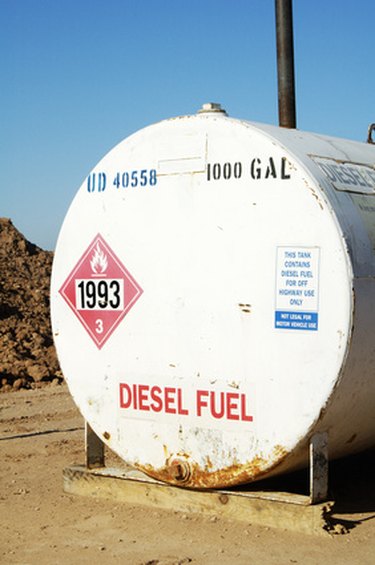
Working with fuels and other hazardous materials can only be done safely when you have an understanding of the properties and dangers of those materials. Diesel fuel, for instance, is stored in liquid form, produces vapors and noxious fumes, and is burned by diesel engines producing exhaust by-products. All of these factors play an important role in how you should handle diesel fuel safely and effectively.
Flammability
Video of the Day

Diesel fuel is a highly-combustible petroleum product regulated by the federal government because of its flammable nature. Used as a burning fuel, this chemical must be stored, transported and handled with care to avoid the risk of exposure to flame and sparks. The hazards of working with diesel include the risk of fire and explosion, situations that can result in property damage, physical injury and even loss of life.
Video of the Day
Environmental Impact
Diesel fuel is a chemical that negatively impacts the environment both during and after its consumption. Liquid diesel is poisonous and when spilled or leaked outdoors, threatens plant and animal species, particularly aquatic life, that come into contact with the chemical. A paper written by Roy J. Irwin for the National Park Service suggests that diesel fuel can threaten not only the animals and fauna coated by a spill, but contaminate ground water and affect "recreation; fisheries; industrial, potable water supply; and irrigation."
By-Product Exhaust
The exhaust produced by diesel engines is scrutinized by organizations like the Occupational Safety and Health Administration (OSHA) for its negative impact on health and widespread use in industrial settings. Exposure to diesel exhaust fumes increases the number of particulates that enter the lungs and can increase vulnerability to lung infections and disease. Lung cancer has also been connected to diesel exhaust particles by the state of California's Office of Environmental Health Hazard Assessment.
Irritant Potential
Diesel fuel is a skin and eye irritant that can cause rashes and reactions when exposed to human skin. Long-term exposure to diesel fuel is also connected to skin cancer and disorders within the central nervous system. Fumes released by the fuel can cause dizziness and drowsiness and even fainting if the fumes are allowed to build up. According to the Hess Material Safety Data Sheet (MSDS) on diesel fuel, swallowing the liquid can cause sickness or chemical pneumonia.